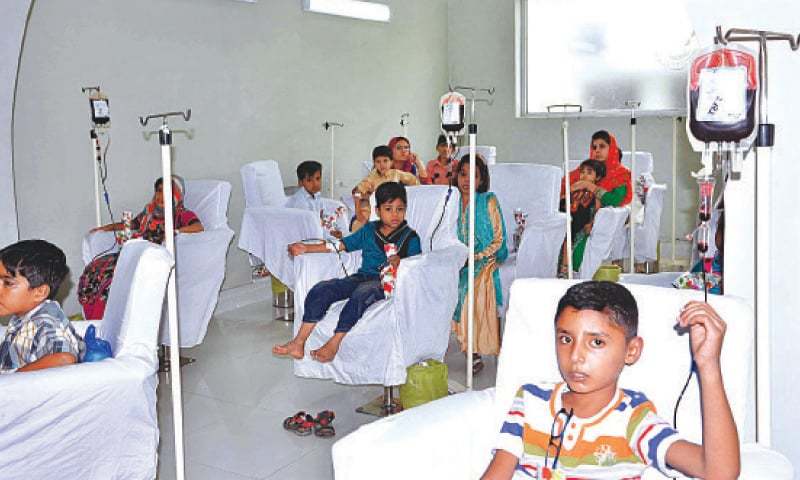
Sahar Safdar
Thalassemia is a genetic blood disorder that impacts hemoglobin production, the protein in red blood cells responsible for oxygen transport throughout the body. Individuals with beta thalassemia have lower hemoglobin levels and fewer healthy red blood cells, resulting in severe anemia and other health issues. Thalassemia is classified into two main types: alpha and beta, based on disorder genetics in hemoglobin structure.
Beta Thalassemia is the most common genetic disorder and highly prevalent in Pakistan. Approximately 6% of the population carries the beta thalassemia gene, meaning six out of every 100 Pakistanis are carriers. With a population exceeding 220 million, this equates to around 13.2 million people being healthy carriers of the defective gene.
Without ongoing blood transfusions, beta thalassemia poses significant life-threatening risks. Symptoms include paleness, a compromised immune system leading to frequent infections, diminished appetite, jaundice (yellowing of the skin), enlargement of organs, particularly the spleen, and persistent fatigue. Managing these symptoms and preventing complications like organ enlargement and severe anemia necessitate regular medical interventions, underscoring the essential role of continuous blood transfusions in thalassemia treatment. These symptoms reflect the body’s struggle to produce enough healthy red blood cells and hemoglobin, leading to various physical and developmental challenges.
Thalassemia is caused by genetic mutation, inherited from parents to offspring. When both parents are carriers of the thalassemia trait, there is a higher risk that their children will inherit the severe forms of the disease. Consanguineous marriages increase the likelihood of inheriting these genetic mutations, contributing to the prevalence of thalassemia in these populations.
Diagnosing thalassemia involves genetic testing to identify mutations in the alpha or beta globin genes. This is crucial for early detection, especially in regions with high carrier rates due to consanguineous marriages. Preventive measures include genetic counseling before marriage to assess the risk of passing on thalassemia traits and prenatal screening during pregnancy to determine if the fetus carries the disorder. Management varies depending on the severity of the condition: for mild cases, regular monitoring and supportive care may suffice, while severe cases like beta thalassemia major require lifelong blood transfusions and iron chelation therapy to manage complications like iron overload. Stem cell transplantation offers a potential cure but is complex and not always accessible. Public health efforts promoting awareness, genetic screening, and access to medical care are critical in reducing the burden of thalassemia in affected communities. There is no effective treatment available for this disorder, so it preventive measures and management are employed.
Organizations like the Thalassemia Federation of Pakistan and other societies under its umbrella provide vital support and advocacy for affected families. Addressing beta thalassemia in Pakistan requires a collective effort from the government, healthcare providers, and the community. Promoting awareness, improving access to screening and treatment, and supporting affected families are essential steps towards reducing the disorder’s incidence and improving the quality of life for those affected.
In conclusion, while beta thalassemia is a significant health challenge in Pakistan, coordinated efforts in awareness, prevention, and treatment can lead to a healthier future for all. Let’s take action today to ensure no child suffers from this preventable genetic disorder.
Writer is student of Biotechnologist (7th Semester) in Department of Bioinformatics & Biosciences, Capital University of Science & Technology





